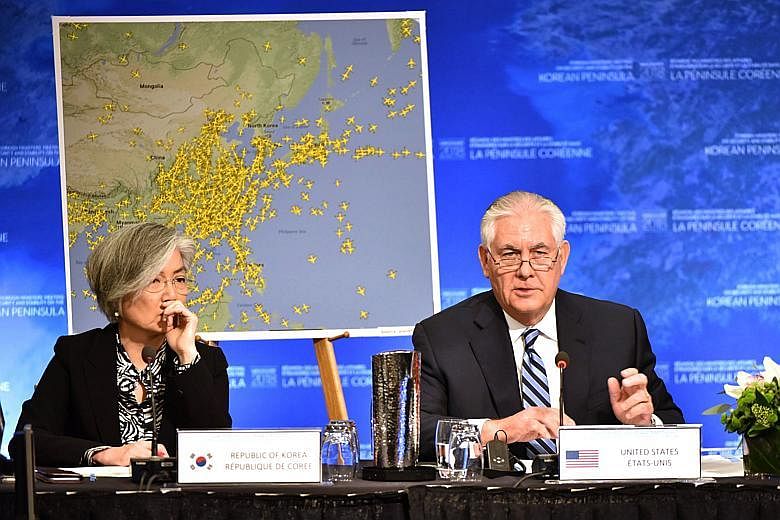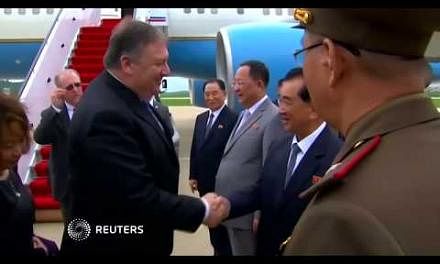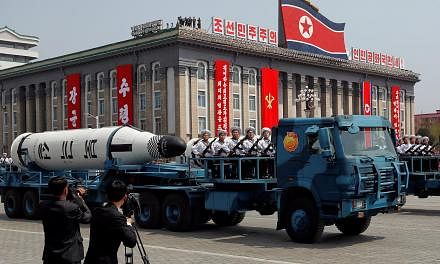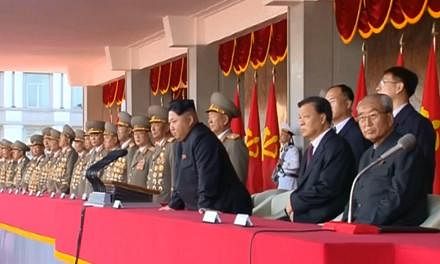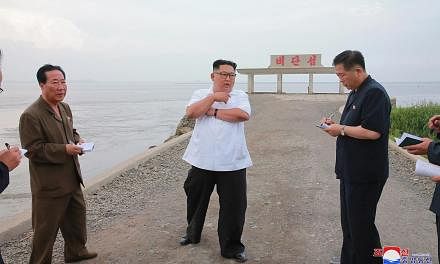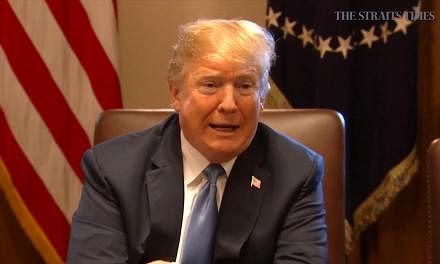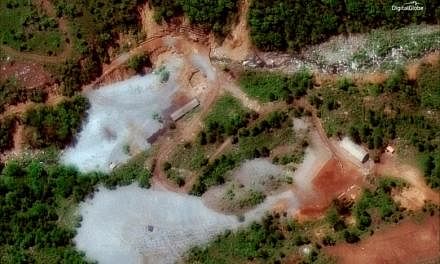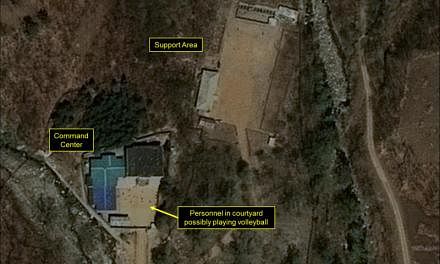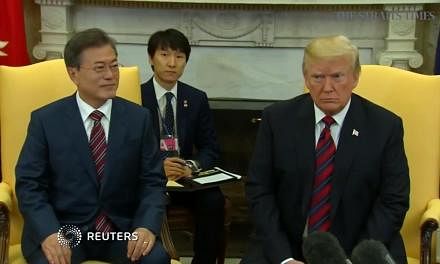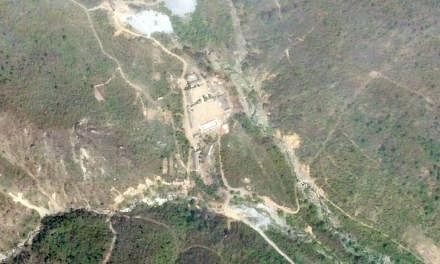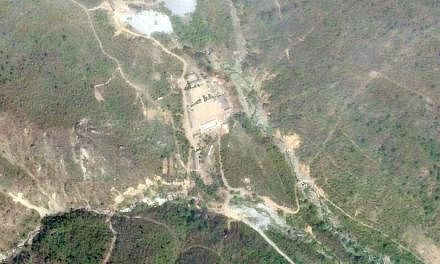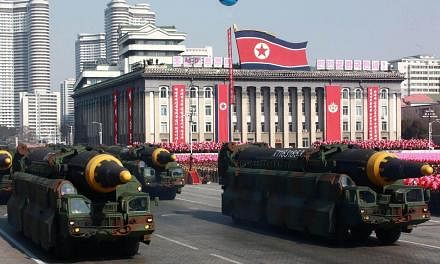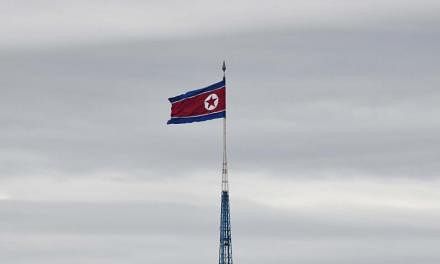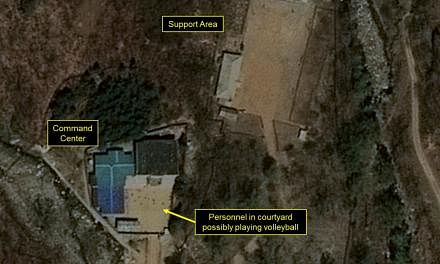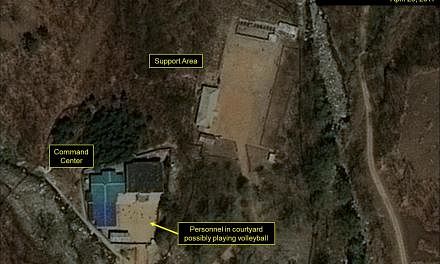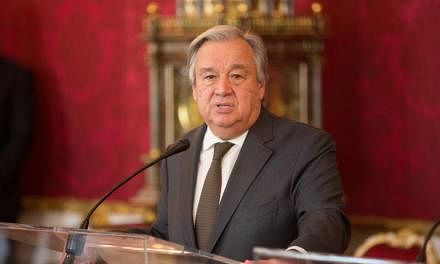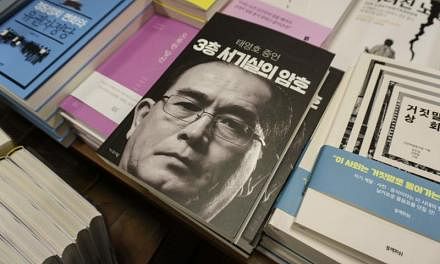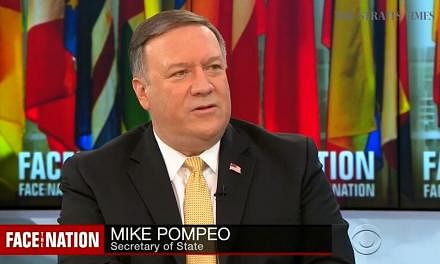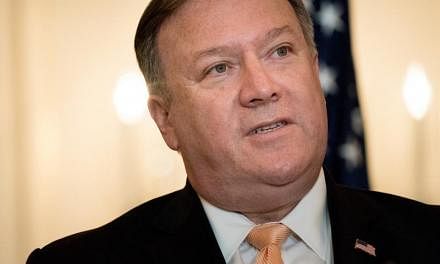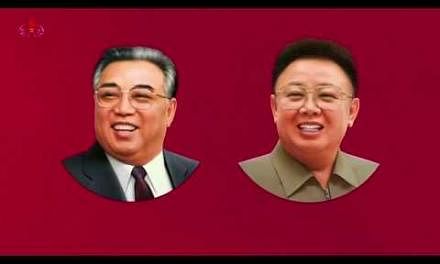VANCOUVER (AFP, REUTERS, BLOOMBERG) - Twenty nations agreed on Tuesday to consider tougher sanctions to press North Korea to give up its nuclear weapons and US Secretary of State Rex Tillerson warned Pyongyang it could trigger a military response if it did not chose negotiations.
Among the tougher steps discussed was naval security operations to prevent maritime smuggling.
Tillerson said it was time for the North Koreans to agree to talks on their nuclear and weapons programmes.
"We have to recognise that the threat is growing and if North Korea does not chose the pathway of engagement, discussion, negotiation, then they themselves will trigger an option," Tillerson told reporters on Tuesday night, shortly before North Korea resumed talks with Seoul on joining next month's Olympic Games in South Korea.
"We're at a very tenuous stage in terms of how far North Korea has taken their program," he said.
The meeting of countries that backed South Korea during the 1950-53 Korea War vowed to support renewed dialogue between the two Koreas "in hopes that it leads to sustained easing of tensions" and agreed that a diplomatic solution to the crisis was both essential and possible. China and Russia were not invited to the talks.
North Korean leader Kim Jong Un has refused to give up development of nuclear missiles capable of hitting the United States in spite of increasingly severe UN sanctions, raising fears of a new war on the Korean peninsula. The United States and Canada co-hosted the day-long meeting in Vancouver to discuss ways to increase pressure on Kim.
The warning of robust new tactics to intercept illicit shipments of nuclear materials or sanctions-busting imports was the most concrete measure to come out of the meeting.
"We discussed the importance of working together to counter sanctions evasion and smuggling and we also issued a call to action to strengthen global maritime interdiction operations to foil illicit ship-to-ship transfers," Tillerson said.
North Korea has been accused of seeking to evade the draconian sanctions imposed on its isolated regime by transferring supplies from foreign vessels to its own on the high seas.
Some experts have argued that naval action to intercept merchantmen would be interpreted as an act of war and trigger a potentially devastating North Korean response.
And reports in Washington suggest that US forces are at least planning for a potential strike of their own, a limited so-called "bloody nose" strike to convince Kim that his safest option is a negotiated settlement.
Tillerson refused to address military planning issues, and would not say whether US President Donald Trump has been in contact with Pyongyang, but he did warn that the crisis is coming to a head.
"With respect to whether Americans need to be concerned about a war with North Korea, I think we all need to be very sober and clear eyed about the current situation," he warned.
"The North Koreans know our channels are open and they know where to find us," Tillerson said, later adding: "It's time to talk, but they have to take the step that says they want to talk."
He rejected any proposal calling for a "freeze" on US-South Korean military exercises in order to get talks started, a recommendation repeatedly made by China and Russia. Kim's government has said its weapons program is essential to its survival and has repeatedly said the US's joint drills with South Korea threaten it.
Many observers, including Beijing and Moscow themselves, had questioned the value of holding a meeting of former Korea War allies to discuss an issue when China's support remains the key to diplomatic success.
Others had noted a stark difference in tone between the hawkish Japanese envoy, Foreign Minister Taro Ono, and South Korea's more cautious Kang Kyung-Wha, who said recent inter-Korea talks were a sign sanctions are already working.
But after the meeting was done, Tillerson insisted the allies will remain united and continue to work with China and Russia to enforce UN-backed sanctions and force Kim Jong-Un to negotiate his own nuclear disarmament.
"Our unity and our common cause with others in the region, most particularly China and Russia, will remain intact despite North Korea's frequent attempts to divide us and sow dissension," he said.
The delegates broadly welcomed North Korea's decision to meet Seoul's representatives and to send a delegation to the South's upcoming Winter Olympics, which many see as a potential breakthrough in the standoff.
But Tillerson warned that more measures may be needed if North Korea continues its provocations, and Japan's Kono urged the allies not to let their guard down.
Without naming South Korea, Kono warned that Kim Jong Un's regime "must be intending to drive a wedge between those tough countries and those that are not so tough." For her part, Kang welcomed international support for sanctions, but her opening remarks carried a more optimistic message than those of her Japanese neighbour.
"I believe that the two tools, tough sanctions and pressure on the one hand and the offer of a different brighter future on the other, have worked hand in hand," she said.
"Indeed the concerted effort of the international community has begun to bear fruit," she explained.
Tillerson insisted after the talks that there is "no daylight" between Seoul and Washington on how to handle the crisis, and that the US-Japan-South Korea tripartite alliance remains "ironclad".
Moscow and Beijing angrily dismissed the Vancouver meeting.
"The most important relevant parties of the Korean peninsula issue haven't taken part in the meeting so I don't think the meeting is legal or representative," said Chinese foreign ministry spokesman Lu Kang.
Lu denounced the "Cold War mentality" of the United States, which is urging Beijing to cut off fuel oil supplies to Pyongyang - a step too far for Beijing, which fears the collapse of Kim's regime more than its surrender.
Trans-Pacific tensions have been running high for months, despite the recent return to direct talks between Kim's regime and Moon Jae-In's government South Korea.
As the talks got under way, Pyongyang responded to Trump's recent twitter warning that his nuclear arsenal dwarfs the North's fledgling missile batteries.
Official party newspaper Rodong Sinmun dismissed Trump's "swaggering" as the "spasm of a lunatic" frightened by North Korea's power and the "bark of a rabid dog".
